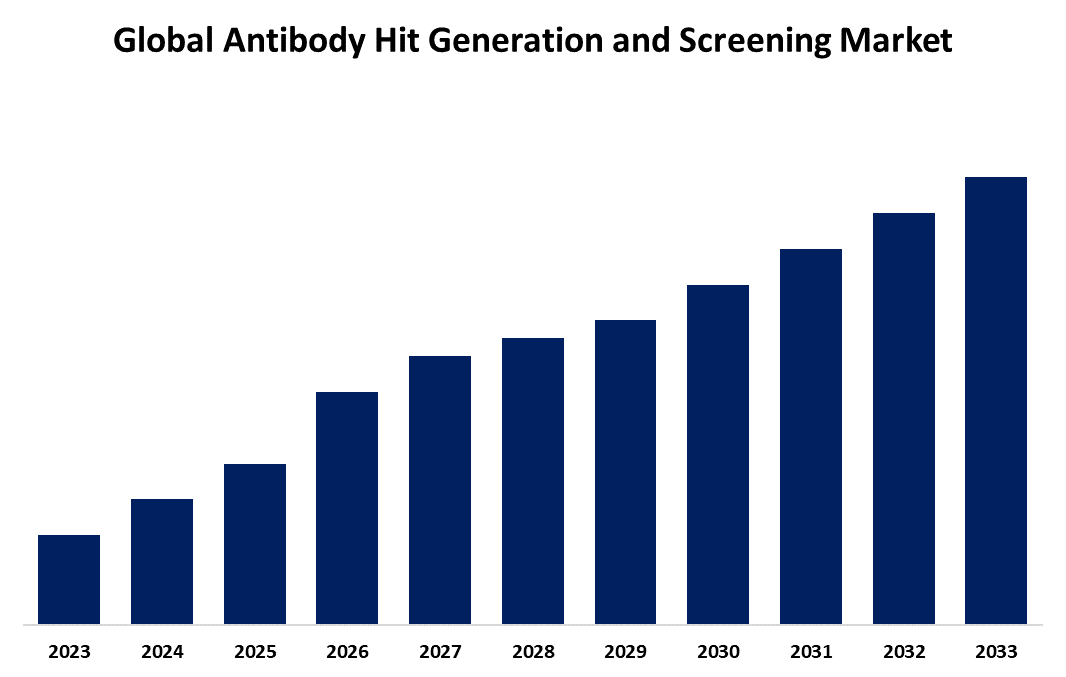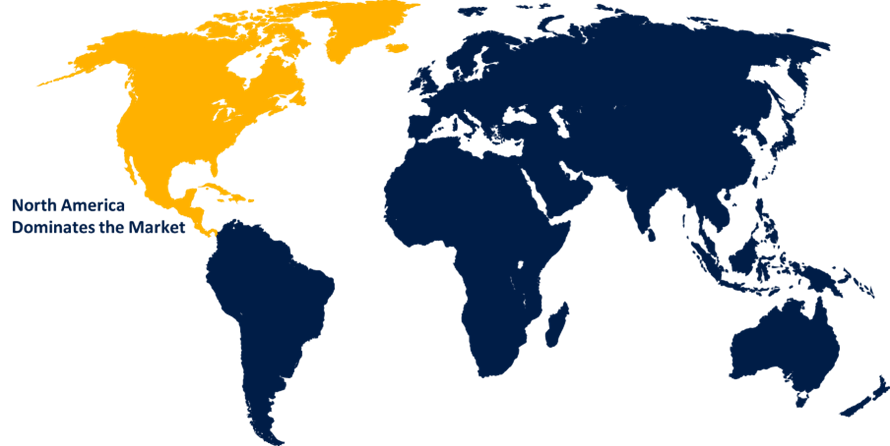Global Antibody Hit Generation and Screening Market Size, Share, and COVID-19 Impact Analysis, By Antibody Type (Humanized Antibody, Chimeric Antibody, Murine Antibody, and Others), By Application (Phage Display, Yeast Display, Ribosome Display, and Others), and By Region (North America, Europe, Asia-Pacific, Latin America, Middle East, and Africa), Analysis and Forecast 2023 - 2033
Industry: HealthcareGlobal Antibody Hit Generation and Screening Market Insights Forecasts to 2033
- The Global Antibody Hit Generation and Screening Market Size was Valued at Significant Share in 2023
- The Market Size is Growing at a CAGR of 9.63% from 2023 to 2033
- The Worldwide Antibody Hit Generation and Screening Size is Expected to Reach Significant Share by 2033
- Asia-Pacific is Expected to Grow the fastest during the forecast period.

Get more details on this report -
The Global Antibody Hit Generation and Screening Market Size is Anticipated to Exceed Significant Share by 2033, Growing at a CAGR of 9.63% from 2023 to 2033. Technological advancements such as grafting techniques can be utilized to produce humanized antibodies that can be used to combat life-threatening diseases such as cancer and autoimmune disorders. This will help to support market growth.
Market Overview:
Antibody hit generation and screening is an important technique for the development of therapeutic antibodies against target antigens that can increase the resistance power of living beings. The rising chronic diseases have significantly contributed to the growth of the antibody hit generation and screening market. The influence technologies such as phage display, hybridoma technology, ribosome display, and yeast display form a widespread library of antibody variants which will further boost the growth of the antibody hit generation and screening market.
The cutting-edge tool has noteworthy diver for the growth of the antibody hit generation and screening market. For instance, the revolutionary Opto B Discovery Affinity Assay. This cutting-edge technique enables researchers to quickly rate antibody findings based on relative affinity, resulting in better selection of top candidates early in the discovery phase.
Challenges:
Identifying selective and potent antibodies necessitates modern technology and robust assays for screening vast libraries, but increasing antibody affinity and stability through affinity maturation is time-consuming and requires specialist knowledge.
Report Coverage:
This research report categorizes the market for the global antibody hit generation and screening based on various segments and regions forecasts revenue growth and analyses trends in each submarket. The report analyses the key growth drivers, opportunities, and challenges influencing the global antibody hit generation and screening market. Recent market developments and competitive strategies such as expansion, product launch, and development, partnership, merger, and acquisition have been included to draw the competitive landscape in the market. The report strategically identifies and profiles the key market players and analyses their core competencies in each sub-segment of the global antibody hit generation and screening market.
Global Antibody Hit Generation and Screening Market Report Coverage
| Report Coverage | Details |
|---|---|
| Base Year: | 2023 |
| Forecast Period: | 2023-2033 |
| Forecast Period CAGR 2023-2033 : | 9.63% |
| Historical Data for: | 2019-2022 |
| No. of Pages: | 280 |
| Tables, Charts & Figures: | 110 |
| Segments covered: | By Antibody Type, By Application, By Region |
| Companies covered:: | AbCellera, MorphoSys, Evelo Biosciences, Icos Therapeutics, Argenx, Kymab, Alnylam Pharmaceuticals, SAb Biotherapeutic, F. Hoffmann-La Roche Ltd, AbbVie, Pfizer, AstraZeneca, Novartis, Eli Lilly, WuXi AppTec, Charles River Laboratories, Syngenta, BioLegend, Creative Biolabs, Eurofins CDMO, Specifica, and Others. |
| Pitfalls & Challenges: | Covid-19 Empact, Challenges, Growth, Analysis. |
Get more details on this report -
Driving Factors:
Increased expenditures in biopharmaceutical research and development are driving innovation and medication growth, which can assist in driving market growth. The rising frequency of chronic diseases such as cancer and autoimmune disorders, which raises the demand for effective antibody-based treatments, could help drive market expansion. Advances in technology such as phage display and computational tools have considerably accelerated the market's growth.
Restraining Factors:
The growth of the market could be limited by a lack of specialist expertise. The high-cost screening tool may also limit industry growth.
Market Segmentation:
The global antibody hit generation and screening market share is classified into antibody type and technology.
- The humanized antibody segment has the largest share of the market during the forecast period.
Based on the antibody type, the global antibody hit generation and screening market is categorized into humanized antibody, chimeric antibody, murine antibody, and others. Among these, the humanized antibody segment has the largest share of the market during the forecast period. Humanized antibodies are driving growth in the antibody hit production and screening market due to their increased safety and efficacy, lower risk of immunological reactions, and suitability for targeted therapies, particularly in the treatment of cancer and autoimmune diseases. The growing demand for such medicines, combined with advances in antibody engineering technologies such as phage display and computational design, has sped up the development of high-affinity humanized antibodies.
- The phage display segment has the biggest share of the market throughout the forecast period.
Based on the technology, the global antibody hit generation and screening market is categorized into phage display, yeast display, ribosome display, and others. Among these, the phage display segment has the biggest share of the market throughout the forecast period. The technology enables high-throughput screening (HTS) via a process known as "bio panning, “in which antibodies are swiftly selected based on their binding strength to target antigens. Phage display is an important technique in current drug discovery due to its adaptability and versatility, which include the capacity to build libraries from other species and combine with other technologies.
Regional Segment Analysis of the Global Antibody Hit Generation and Screening Market
- North America (U.S., Canada, Mexico)
- Europe (Germany, France, U.K., Italy, Spain, Rest of Europe)
- Asia-Pacific (China, Japan, India, Rest of APAC)
- South America (Brazil and the Rest of South America)
- The Middle East and Africa (UAE, South Africa, Rest of MEA)
North America is projected to hold the largest share of the global antibody hit generation and screening market over the forecast period.

Get more details on this report -
North America is projected to hold the largest share of the global antibody hit generation and screening market over the forecast period. North America is a powerhouse for pharmaceutical and biotech companies, which drive innovation in antibody discovery. Significant investments in R&D drive advances in antibody engineering and screening technologies, which are aided by cutting-edge approaches such as phage display and hybridoma technologies. Favorable regulatory regimes promote the development and commercialization of novel antibody-based therapeutics. Furthermore, the region's growing desire for personalized therapy necessitates the development of different antibody libraries suited to individual patient requirements.
Asia-Pacific region is expected to fastest CAGR growth during the forecast period. The growing chronic diseases and rising technological development in this region have significantly contributed to the growth of the market. The increased research and development facilities are expected to drive the growth of the market.
Competitive Analysis:
The report offers the appropriate analysis of the key organizations/companies involved within the global antibody hit generation and screening market along with a comparative evaluation primarily based on their product offering, business overviews, geographic presence, enterprise strategies, segment market share, and SWOT analysis. The report also provides an elaborative analysis focusing on the current news and developments of the companies, which includes product development, innovations, joint ventures, partnerships, mergers & acquisitions, strategic alliances, and others. This allows for the evaluation of the overall competition within the market.
List of Key Companies:
- AbCellera
- MorphoSys
- Evelo Biosciences
- Icos Therapeutics
- Argenx
- Kymab
- Alnylam Pharmaceuticals
- SAb Biotherapeutic
- F. Hoffmann-La Roche Ltd
- AbbVie
- Pfizer
- AstraZeneca
- Novartis
- Eli Lilly
- WuXi AppTec
- Charles River Laboratories
- Syngenta
- BioLegend
- Creative Biolabs
- Eurofins CDMO
- Specifica
- Others
Key Market Developments:
- In December 2023, Mice with humanized immune systems explore a new cancer therapy strategy that blindfolds immune cells and the body's self-recognition mechanism.
- In June 2022, Specifica, a privately held antibody engineering company focused on innovative in vitro antibody libraries and discovery tools, announced that it has reached an agreement with the global healthcare company Sanofi to transfer Specifica's patented Generation 3 Antibody Discovery Platform.
Key Target Audience
- Market Players
- Investors
- End-users
- Government Authorities
- Consulting And Research Firm
- Venture capitalists
- Value-Added Resellers (VARs)
Market Segment
This study forecasts revenue at global, regional, and country levels from 2020 to 2033. Spherical Insights has segmented the global antibody hit generation and screening market based on the below-mentioned segments:
Global Antibody Hit Generation and Screening Market, By Antibody Type
- Humanized Antibody
- Chimeric Antibody
- Murine Antibody
- Others
Global Antibody Hit Generation and Screening Market, By Application
- Phage Display
- Yeast Display
- Ribosome Display
- Others
Global Antibody Hit Generation and Screening Market, By Regional
- North America
- US
- Canada
- Mexico
- Europe
- Germany
- Uk
- France
- Italy
- Spain
- Russia
- Rest of Europe
- Asia Pacific
- China
- Japan
- India
- South Korea
- Australia
- Rest of Asia Pacific
- South America
- Brazil
- Argentina
- Rest of South America
- Middle East & Africa
- UAE
- Saudi Arabia
- Qatar
- South Africa
- Rest of the Middle East & Africa
Frequently Asked Questions (FAQ)
-
1. What is the CAGR of the global antibody hit generation and screening market over the forecast period?The global antibody hit generation and screening market size is expected to grow from Significant Share in 2023 to Significant Share by 2033, at a CAGR of 9.63 % during the forecast period 2023-2033.
-
2. Which region is expected to hold the highest share in the global antibody hit generation and screening market?North America is projected to hold the largest share of the global antibody hit generation and screening market over the forecast period.
-
3. Who are the top key players in the antibody hit generation and screening market?AbCellera, MorphoSys, Evelo Biosciences, Icos Therapeutics, Argenx, Kymab, Alnylam Pharmaceuticals, SAb Biotherapeutic, F. Hoffmann-La Roche Ltd, AbbVie, Pfizer, AstraZeneca, Novartis, Eli Lilly, WuXi AppTec, Charles River Laboratories, Syngenta, BioLegend, Creative Biolabs, Eurofins CDMO, Specifica, and Others.
Need help to buy this report?